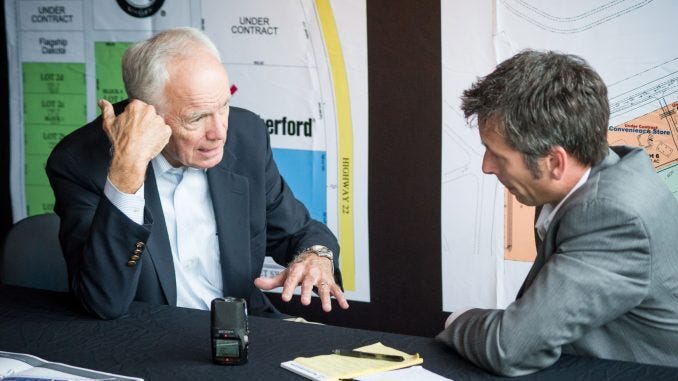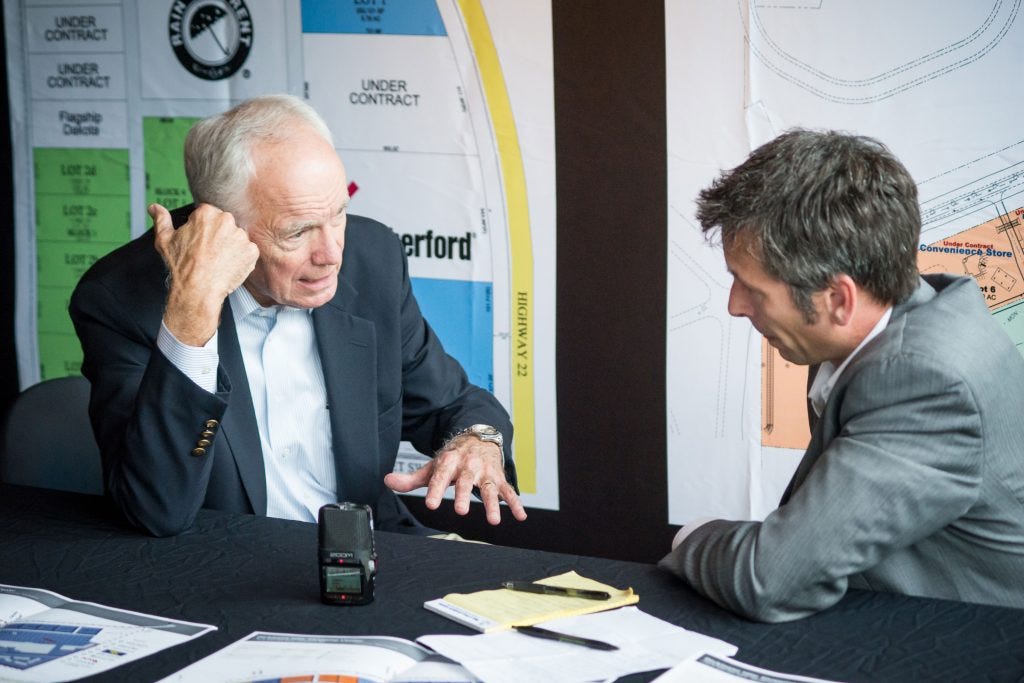Dr. Loren Scott of Loren Scott & Associates just finished his annual Economic Forecast for the State of Louisiana and the news is the economy is going to get better, but first it’s going to get worse. The interview explains why from OPEC to European gas to natural disasters to Biden’s policy’s.
“People should be prepared for a national recession. It’ll start probably in the first quarter of next year and the last three quarters,” said Dr. Scott.
Dr. Scott said Louisiana is a different economy than other states due to their importing exporting ports, fossil fuel ecosystem and natural disasters. Over the past year and a half Louisiana has experiences five natural disasters and the rebuild will happen during the national recession. Dr. Scott believes as a whole, the state will add more than 14,000 jobs in 2023 and more than 30,000 jobs in 2024.
“Three major hurricanes, Winter Storm Uri, and floods have seriously arrested the state’s growth,” Dr. Scott said.
The interview also dives into Europe’s decisions to go “all-in” on the Green Movement and outlaw fossil fuels. Dr. Scott believes Europe is going to have a rough, expensive winter, pointing the blame at their full commitment to doing away with fossil fuels.
Dr. Scott also explains why taking barrels out of the Strategic Oil Reserves is putting America at risk and why the current direction of natural gas is putting places like Chicago and New York at risk this winter.
Dr. Scott also gives an update on Lake Charles and the $3B dollars of activity happening in that region.
Loren C. Scott & Associates, Inc., is a 35-year old firm that provides economic consulting and public speaking services for a wide range of clients. Consulting activities include impact studies, forecasting services, analysis of policy proposals, and general economic analyses. Consulting clients include BP, ExxonMobil, Entergy Corporation, J. P. Morgan Chase, Capital One Financial, Nucor, Sasol, and a diversity of others. Our objective is to put together the very best team of associates to attack our client’s problems. Dr. Scott makes 50-70 presentations a year on the state of—and the outlook for—the economy and the energy sector in particular.
He is one of the 32-member National Business Economic Issues Council, which meets quarterly to discuss issues of state, national, and international interest. This group has experts who cover international trade, Washington economic policy, retail trade, trucking, steel, chemicals, etc. Dr. Scott is an energy specialist on the NBEIC. He has been appointed to the Economic Advisory Board of the U.S. Council on Competitiveness—a group made up of the CEOs of the Fortune 100, top university presidents, and presidents of three major unions.
He has been interviewed on MSNBC, CNBC, Bloomberg TV, and several local TV stations and his work has been cited in such publications as the Wall Street Journal, the Financial Times, USA Today, the Los Angeles Times and the Moscow Times, to name a few.
Dr. Loren C. Scott is President and founder of the firm. He was on the Economics Department faculty at Louisiana State University from 1969 to 1998, where he rose through the ranks from Assistant Professor to the holder of the Freeport-McMoran endowed Chair of Economics. He is presently Professor Emeritus of Economics at LSU.
Over the thirteen-year period from 1983-96, Dr. Scott was the chairman of the Economics Department at LSU. During that time, the Department’s ranking among the 3,000 economics departments in the U.S. rose from 101st to 38th. He received 7 awards at LSU for outstanding classroom teaching.
Dr. Scott is co-developer of the Louisiana econometric model, a model used for providing annual forecasts of the Louisiana economy, which are released each fall. He was a co-investigator on over $1 million in grant research at LSU and is the author of over 75 articles and technical reports in addition to reports written for consulting clients.
Below is the Artificial Intelligence Transcript, there may be some errors in spelling and names.
Voice Artist
The Crude Life with host Jason
Jason Spiess
Space. Doctor Lauren C Scott on the line with us here. He's with Lauren C. Scott and Associates, a consulting firm out of Louisiana. Of course, he also does some economic work for Louisiana State University. Professor Emeritus. Is that how you pronounce
Dr. Loren C Scott
it? That's right. Emeritus is an old Latin phrase that means small interior office.
Jason Spiess
Ah, I see. I see. I thought it was Latin for place to hang a hat. I wasn't sure. So, uh, well, let's talk about the economic outlook for Louisiana in just a moment here. I know you, uh, are a part of that, but, hey, a lot's going on, uh, in the last week in oil and gas.
You know, we've got the Nords STT two pipeline. We've got OPEC, we've got Saudi Arabia, we've got China, we've got Russia. Let's just, uh, let, let you know, you start wherever you want to start, man, because it's a, it's a, today
Dr. Loren C Scott
it is, there is so much going on. It's, it's kind of interesting. I was telling some people the other day about how difficult it is to forecast oil prices. It seems like every time I come out with my report, uh, and I send it to the printer to get printed up that within the next two or three weeks, something major happens. Like last year I sent it in and uh a month, you know, I have oil prices being around $80 a barrel. And then, uh, then, uh I send it to the printer two months later, rush it in
Ukraine. And then this year I, I just send it to the, to the printer just getting out of the speaking circuit. And suddenly OPEC decides to take two million barrels off the market. So you just, you just never know again. I think this is the second most difficult thing in the economy to forecast. And it is, it is a strange world out there right now.
Jason Spiess
Historically, what, what happens when someone takes off a million or two million barrels?
Dr. Loren C Scott
Well, the key thing to remember is something you learned, your principals economics class. There's so much people learn there that if they could just remember it, it'll help them figure out what's going on. And one of the things you learned was something about the elasticity of demand that basically uh basically what we'd say about oil, oil is that the demand for oil is very inelastic.
It's, it's a very steep uh demand curve. And what that means is it doesn't take much of a change in supply to cause an outsized change in the price of oil. So if a does take two million barrels of oil off the market, then you can expect the price of oil to pop up maybe from the 84 range that we had been experiencing to nearly $100 a barrel. So that, that can happen.
And what's kind of interesting Jason is to figure out, is this really a two million barrel cut or is it, is this, is this a two million barrel cut in actual output or is it a two million cut in their quotas that they've assigned to people? Most people read, what they're saying is a two million cut in quotas. Well, if that's the case, it's not going to really be a two million cut in output.
I know this is a little convoluted but there are several of their member countries, especially those in Africa that already are not meeting their quota and there are other countries that are not meeting their quotas right now. And so what is gonna happen? But if they say we're going to cut our quotas for two million, probably the total cut in output will be like 1.2 or so.
So it's gonna be a smaller number, but it's still going to be enough to cause the price to change. I think most of those cuts will come from Saudis, the UAE and Kuwait. The other people are already, I mean, they're already cut back but, but we're going to see about a $1.2 million a million barrel cut in output.
Jason Spiess
You mentioned prices, you know, possibly could go up on the, on the flip side of it. We have a strategic petroleum reserve being, you know, being dipped into being sold. What, however you wanna, you know, phrase it, how does that, I, first of all, what is that gonna do to the market? And, and secondly, what, what, what does that do to the supply going into the winter?
Dr. Loren C Scott
Yeah. Well, uh, first of all, I mean, the, the whole idea of strategic Petro Reserve was to, to, to use it in case there is a really major emergency. Well, the reason it's being used right now is there is a major emergency looming out there and it is the September elections. That's the, that's the emergency because you would be stunned to see how much people vote, depending on what the price is at the pump.
And, uh, so one of the ways that Greece, you know, as a result of the Russia Ukraine bump that went up, one of the ways that the president responded was by taking oil out of the strategic petroleum reserve. Since last March, it's averaged about 860,000 barrels a day. So it's a lot matter of fact, he's driven the S pr down to about where it was in 1983.
And what that means now is that in the face of the OPEC cuts now, he really doesn't have that tool to use. Uh, he, he really can't drive it down that much further. I don't think, uh, there's just not enough of it there to rule how much you could take out. So it's not going to be a tool that he's gonna be able to use very well going forward.
So, I think, uh, the result is that we're going to see, uh, some price bump and we've already seen a bit of a price bump and we haven't even get to the cut yet. I think they take place in, uh, in November. So, um, I don't know, it's, uh, I don't, I don't think the S pr is gonna be a very useful tool going forward.
Jason Spiess
Couple of things I wrote in my notes here in 1983 and the uh supply reserve. Um, uh, the first one is, I've always been told that the United States really only has, uh, a day or two of energy storage on backup and maybe 30 days supply of uh, petroleum. Um, you know, what, what, what, what's going on with that. But like I said, going into the winter time, you know, Chicago last year, boy, they were on the brink of becoming California last year on the grid.
Dr. Loren C Scott
Well, I think their, their issue there is more natural gas, I think, than oil. Not that familiar, but they're more a natural gas issue. I mean, here's, this is gonna be an interesting winter, Jason because, right, you know, when Russia invaded, uh, the Ukraine, uh this really messed up the, the market for energy, especially in Europe. Now, what your listeners have to understand is that Europe is probably the continent in the world that went whole hog into the green thing.
They outlawed fracking. They want to keep fossil fuels in the ground and they switched heavily to solar and to wind. Now they're getting ready and they were, what they were doing is they were having, because they outlaw tracking, they were having to rely on Russia for about 45% of their natural gas that they used. Well, now, of course, the Nords Stream two pipeline has been sabotaged before that.
Putin was turning it on, turning it off, turning it on, turning it off saying it was for maintenance purposes. But in reality, he was just showing Europe, you know, you start, you start providing, you know, support of any kind of political and our military to the Ukraine watch what we can do to you. And so what has happened is the price of natural gas in Europe.
This past September was $71 per million BTU. Ok, because there was such a shortage of it over there and we compare that to $7 here in the United States. Well, I mean, so now we're going into the winter with a shortage of natural gas and, um, the Europeans are going to have to do one of two things. They're gonna either have to let their people freeze or they're going to take all the natural gas they can away from the industry and use it to heat homes, which means you're gonna have to shut
down the industry. And if you go to Lushawn, uh, the BS F plant in Lushawn Germany that 39,000 people, I point this out, there's 200 plants in that one site and they're, they're talking about shutting that sucker down for the winter. You think 39,000 people are going to lose their jobs. So, and, and this is going to be a very cold winter. Remember a lot of people think Europe is bad on the line with Dallas or maybe Atlanta Europe is on the line with Toronto.
They're even higher up than you guys are there in North Dakota. This is gonna be, it's gonna get cold there. And so Jason, the key point here is that the Europeans are about to learn what happens when you go whole hog into renewables and you give up fossil fuels. And I think that they are going, I think the general public public over there is going to say, what the hell have we been doing?
This is stupid. We've got natural gas under us. Let's drill from the dead gum natural gas. We'd rather have that than freeze to death. Ok. So I think you're going to see a major shift in people's attitudes towards fossil fuels after this winter because you're gonna have people freezing in Europe. You're gonna find industries going in the tank in Europe.
And by the way, among those industries going into the tank are the ammonia fertilizer people. Ok. They, they make ammonia fertilizer out of natural gas in Europe. And there's going to be a lot of ammonia fertilizer that's not going to be produced in Europe, this coming, this coming winter. And as a result, guess what else is gonna happen? It's gonna follow.
You're gonna have food famine issues again, especially in Africa, but it's going to be all over the place. And so I, I just think this is going to end up being a disastrous winter for them and it's going to spread all over the place. And suddenly I think you're going to see a change in people's attitudes towards fossil fuels,
Jason Spiess
Nordstrom. You mentioned the, the pipeline there, there was, uh, some saboteur happening, uh, fingers are being blamed. So, I mean, not only do you have the actual physical damage but now you've got some geopolitical damage too. What's, uh, what, what, how is that impacting the market with the price and also with the futures?
Dr. Loren C Scott
Yeah. Well, of course, the main thing that's impacting the price of natural gas and the built in it is compounding Europe's problem, solidifying Europe's problem going into this coming winter because they, that's, there are a number of natural gas pipelines coming into Europe from Russia. But that was kind of the key one that was feeding the Germany.
And of course, Germany is the industry powerhouse in the Eu. And, uh you know, now they just, now they're just really faced with shutting down a lot of industry. And so what people are, you know, will Rogers once said that there are three kinds of people in the world. There's the people who learn by reading, they're the people who learn by observation. And then some people just have to pee on the electric fence to learn. And I, I don't want to mess up your radio show, but basically,
what's going on here is Europe is peeing on has been peeing on the electric fence and they're, they're gonna find out what, what they're gonna learn the harsh lesson this coming winter. And I think it's maybe changing people's attitudes all across the globe when they see what happens when you go log into uh into renewables and say we're not going to do more fossil fuels.
Jason Spiess
One of the other areas that I think the awareness and the education is gonna come through is the supply chain and some of the inflation. Um If you go back and take a listen at uh Doctor Lauren Scott here on the crude life, we were tackling these supply chain issues long before the mainstream media, in fact, uh because it was a hurricane that was shutting down some of the refineries down there about a year ago.
That was, and then the Huntington Beach thing happened shortly after that. So the supply chain inflation issues were happening, kind of they, they were creeping up earlier than people thought this is, uh, you mentioned food and I wanted to bring up a couple of areas because a lot of people don't understand the fossil fuel connection with food, whether it be, you know, the, the tractors or the feed stock, but Canada, Canada came out and, and, and really uh went all, all in against
uh pesticides and some fertilizers and a number of different things. So they, the, the Canadian crop market is gonna be impacted next year. The Ukraine had uh tens of millions of acres of wheat that were burned in the conflict happening over there. You mentioned the things happening over in Africa. Um I, I do think number one, we're gonna have some food shortage issues next year.
Number two though, I think this is gonna be kind of an educational piece uh on the flip side of it as well. How, how do you read some of the supply chain issues? Whether it be from the food side of things or from the oil and gas, getting things out to the market side?
Dr. Loren C Scott
Well, I think the key thing is that when you have uh a country like Canada or Sara Laa, for example, that says, you know, we're not gonna use uh uh, ammonia fertilizers anymore. We're going to, we're not using pesticides anymore. Basically, what they're doing is a pin on the electric fence. Ok. It only take, and it turns out it only takes one year to learn your lesson than that because the next year your crop output is so much lower that you got rising food prices, which will cost you
politically beyond belief. And secondly, it, it just creates, uh, you know, it's really nice to go to a grocery store and see all those goods, canned goods and all those fresh vegetables around when they're not there. I mean, that's, that's, that's really, really bad. And you can, you, you, you experience that like in Sierra Locka, they experienced that one year of food shortages and they rioted and they said, hell no, let's get the, let's get the ammonia fertilizer back here.
We need to grow food. So it's one of those things where it seems like it's really smart on the surface. Maybe initially it's a great thing. It's a green thing. But then when you have to deal with the reality, you say, oh, shoot, this hurts. This is a bad plan. And so they will, they will, unfortunately, on the food side, they learn that very quickly.
That's not something that takes four or five or six or seven years. You learn it straight away. And I think Canada and Sierra loco has already learned it and Europe is going to learn it too,
Jason Spiess
economic outlook for Louisiana. Of course, there's a lot of annual meetings happening right now, whether it be in oil and gas or agriculture or universities, um, talk about uh this economic outlook that came out, you uh published last week.
Dr. Loren C Scott
Well, as it turns out, if you look at a map of the United States, look at the 50 you look at the 50 states and look at how, how far the state is coming recovering from the shutdown due to COVID. You'll find that most of, many of the States in the United States are either 100% back or very, very close to that. But in Louisiana, we're only 69% back as 68% back as, as of this past June.
And that's the second worst performance in the country. And the primary reason for that is not because our economy generally sucks. It's because we've had five count since COVID five major natural disasters. We've had three major hurricanes, winter storm, Erie and a major flood in Lake Charles area. And so basically we're way down because, you know, when you have a natural disaster, your employment drops off like a be part of a bee, you just go straight down.
Well, we're in the process of coming up the other side of that be, uh, it is kind of natural to recover, get those jobs back from the natural resource disaster. But ours was so heavy and so many that we've been very slow to get back. But right now, if you look across our state, generally speaking, the economy is very good. Um or down along the southern part of the state, this is where your L N G export terminals are coming in.
Europe desperately needs natural gas. And the way, one of the ways they're going to solve their problem is to import more of it through L and G. But we have a lot of L N G terminals down along the southern part of the state. Uh because we, there's access to a lot of natural gas, a lot of natural gas pipelines and you have access to the Gulf of Mexico, which means you can ship it out and get it to the world markets.
So, uh we also because the price of natural gas is seven here versus 71 in Europe, B A S F has to find another place to grow. Well, guess what they're gonna do, they're gonna chase the cheapest molecules. Uh And those cheapest molecules are located in South Louisiana and Southeast Texas. So you're going to see a lot of chemical firms coming to the southern part of Texas and the southern part of Louisiana. Um And then we just, we just have a number of other good things that are, that are
unusual in each one of these, each one of these pockets of the state that are causing it to do well. So I'm I'm actually predicting that there will be a national recession in the first three quarters of 2023. But I think Louisiana's employment will grow right through it. Uh, because we're recovering, we're coming up the other side of the bee from these natural disasters. And also because there are just a lot of good energy related things that are going on in the state.
Jason Spiess
Doctor Lauren Scott. Hey, you got time for one more question. ...
Dr. Loren C Scott
Yeah.
Jason Spiess
So, and, and you don't have to answer this, but uh you're somewhat familiar with it up here in uh North Dakota as well as some of the surrounding states. The uh Chinese have been buying up uh land to use for agriculture reasons and we've got some uh other states where I've, I've been researching where for energy products and uh uh projects and a number of things like that down in Louisiana and Texas, you know, Saudi Arabia, I think they bought a refinery a couple of years ago.
I know you've mentioned several times that the some European countries have been active with the L N G market down there. Um How, how does all that fit into where the commodities market is going? You know, because if we're gonna be growing crops in America and sending them, you know, having Chinese companies, you know, overseeing it or European
companies or whatever the case is, do, does that change how we do things or, I don't know, do you guys get into that down there. Do you care about the foreign ownership? I guess.
Dr. Loren C Scott
Not really. I mean, because we have, you know, if you look at the chemical plants and the refineries down here, they are all over the place and there's a lot of foreign ownership, foreign direct investment in Louisiana because this is where there's access to a lot of energy, there's access to a lot of natural gas, access to a lot of crude oil.
So we don't really worry about it. And I, I would encourage people out there not to be too concerned about this. Uh I know you think, well, the Chinese are kind of taking over but if things get really more uncomfortable or are looking bad, like this is turning into something bad, all the risk is with China. I mean, because all we have to do is nationalize the thing and kick them out just like, you know, when we were in Venezuela or in the, in the oil field, they just nationalized, it
kicked us out. And uh so uh the, the risk all the risk is to the foreign investor because at any time we, we don't do this, but at any time we could uh we could take over, we could simply take over their uh their company, take their land away from them. So I, I, I, I don't worry about that so much. We have a lot of it here. It really has affected our economy. All that much is
Jason Spiess
that, um, are the port still going pretty good down there? Lake Charles, is that activity still happening
Dr. Loren C Scott
in the port
Jason Spiess
in Lake Charles and down in that area? Yeah.
Dr. Loren C Scott
Yeah, I mean Lake Charles, Lake Charles is still, I mean, I said that we're, the state is 68% recovered. Lake Charles is only about 45% recovered because, yeah, Lake Charles had two major hurricanes and they had winter storm and they had a big flood. They had four major hits to them since COVID. And so they're still coming up the other side of the beat.
If you look at Lake Charles, Lake Charles is basic industries. It's in, it's manufacturing employment, all its refineries and its L and G facilities and its chemical plants. They're back to where they were pre COVID. Their problem is being in the construction side, the industrial construction site which is about to turn around. They're about to have some major announcement that's going to turn around.
Their leisure and hospitality side is down, but they're getting ready to open up a brand new casino that'll take care of that. They're getting ready to really pop up. We think they'll be the fastest growing here in the state because they're coming up the other side of their be and they're gonna be coming up pretty quickly.
Please consider supporting those who are Living The Crude Life! The oil and gas worker is experiencing the same public relations issues the farmer’s faced decades ago when the grocery story replaced them. Only it’s the light switch that has replaced those Living The Crude Life.
Your company and/or personal support will allow positive, informational and educational stories, interviews and podcasts to continue. Real talk. No scripts. Just energy experts and real crude talk.
Paid Subscriptions are only $5 and keep the articles, podcasts, news, essays and insights coming.
Network online, in social media groups and in podcast land! Support the industry’s voice for only $5!
Did you know supporting The Crude Life is more sustainable for the planet than a $5 Starbucks Coffee? You have the power to make a difference! Support The Crude Life today!
For guest, band or show topic requests, email studio@thecrudelife.com
About The Crude Life
Award winning interviewer and broadcast journalist Jason Spiess and Content Correspondents engage with the industry’s best thinkers, writers, politicians, business leaders, scientists, entertainers, community leaders, cafe owners and other newsmakers in one-on-one interviews and round table discussions.
The Crude Life has been broadcasting on radio stations since 2012 and posts all updates and interviews on The Crude Life Social Media Network.
Everyday your story is being told by someone. Who is telling your story? Who are you telling your story to?
#thecrudelife promotes a culture of inclusion and respect through interviews, content creation, live events and partnerships that educate, enrich, and empower people to create a positive social environment for all, regardless of age, race, religion, sexual orientation, or physical or intellectual ability.
Spread the word. Support the industry. Share the energy.
Click on picture for BIG SAVINGS! Check out these Amazing American Environmental Entrepreneurs! Don’t forget that the promo code OTIS unlocks big big savings!
if link is broken, use promo code OTIS at www.mystore.com and www.mypillow.com



















The Crude Life Podcast: Dr. Loren Scott Explains Oil Prices, OPECs Impact & Energy Economics